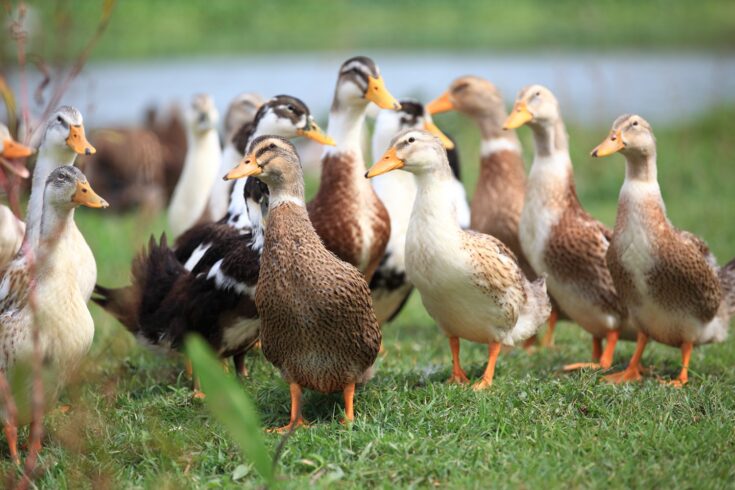Some of the UK’s top scientists are to set to join forces in a major new research consortium in the UK’s battle against bird flu.
The eight-strong consortium, headed by the world-leading research team at the Animal Plant Health Agency (APHA), has received £1.5 million from the Biotechnology and Biosciences Research Council (BBSRC) and the Department for Environment, Food and Rural Affairs.
The consortium has been tasked with developing new strategies to tackle future bird flu outbreaks.
This year’s bird flu outbreak has been the largest and longest ever experienced in the UK and in many parts of Europe.
The outbreak started earlier than previous years after the virus continued to circulate in Europe over summer 2021 and led to over 100 cases in the UK.
Containing future outbreaks
It is hoped the consortium will be able to find new ways to contain future outbreaks. The news will be a significant boost to the UK’s poultry sector and rural economy.
The sector has experienced significant disruption from this year’s outbreak with compulsory indoor housing measures put in place to protect poultry from this horrible disease.
The consortium will focus on building our understanding in a number of key areas, including:
- what it is about the current virus strains that helps them to form larger and longer outbreaks
- understanding transmission and infection in different bird populations, including:
- how the virus transmits from wild birds to farmed poultry
- the gaps in biosecurity that allow the virus to penetrate premises, and how this could be addressed
- mapping and modelling the spread of infection over time and across species
- why some birds, such as ducks, are more resistant to bird flu strains
- developing models to predict how the viruses will evolve and spread in the future
- informing risk mitigation measures in birds to reduce disease burden thereby protecting against zoonotic transmission occurring from animals to humans. This will prevent future spillovers of influenza with pandemic potential into humans.
Combining national expertise
The UK’s Chief Veterinary Officer, Christine Middlemiss, said:
The recent outbreak of bird flu has significantly affected our poultry industry and, thanks to our hard-working scientists, vets and farmers, we have been able to stamp out disease.
This new consortium will allow us to combine our expertise at a national level to increase the speed and quality of our research, ensuring we can develop new strategies to aid our efforts against this insidious disease.
Protecting the UK
Professor Ian Brown, APHA’s Head of Virology and project manager, said:
The Animal and Plant Health Agency provides first-class scientific expertise when it comes to protecting the UK from avian influenza.
Today’s investment in a new research consortium will help bring together the greatest minds from eight world-leading British institutions to address gaps in our understanding of bird flu.
This will ensure we can continue our crucial role in furthering animal health science and curb harmful diseases that have greatly impacted poultry keepers over the last year.
Understanding an unprecedented outbreak
Professor Melanie Welham, Executive Chair of BBSRC, said:
One of the real strengths of the UK’s scientific response to disease outbreaks is the way that we can draw on leading researchers from all over the country, who can pool their expertise to deliver results fast.
This new national consortium will study the unprecedented avian influenza outbreak to better understand this latest strain and how to tackle it.
This will feed rapidly into government decision-making and new strategies to protect the poultry industry and reduce the risk of future transmission to humans.
World-leading researchers
UK researchers are already world-leaders in studying bird flu, with APHA hosting an International Reference Laboratory, that conducts testing on global samples and rapidly shares the latest information internationally on outbreaks.
The knowledge gathered will also be shared with international partners to aid their efforts to tackle the disease with benefits for global risk mitigation.
Members of the consortium will also attend a global session this month, hosted by the US Department of Agriculture, where they will influence and coordinate future investment into animal influenzas on an international basis.
Further information
Avian Influenza Consortium members
The consortium members include:
- APHA
- The Pirbright Institute
- Royal Veterinary College
- The Roslin Institute
- University of Cambridge
- Imperial College London
- University of Leeds
- University of Nottingham.
Research expertise
Consortium researchers bring together expertise across many areas, including:
- microbiologists
- epidemiologists
- virologists
- genomics specialists
- mathematical modelers
- translating science evidence into formats that can be used by policymakers.
Animal Influenza Research Review
The research gaps addressed by the consortium have been identified from the recent International Research Consortium on Animal Health Animal Influenza Research Review and knowledge gaps identified during the current outbreak.
Top image: Credit: jKanmu, E+ via Getty Images

